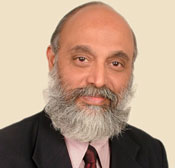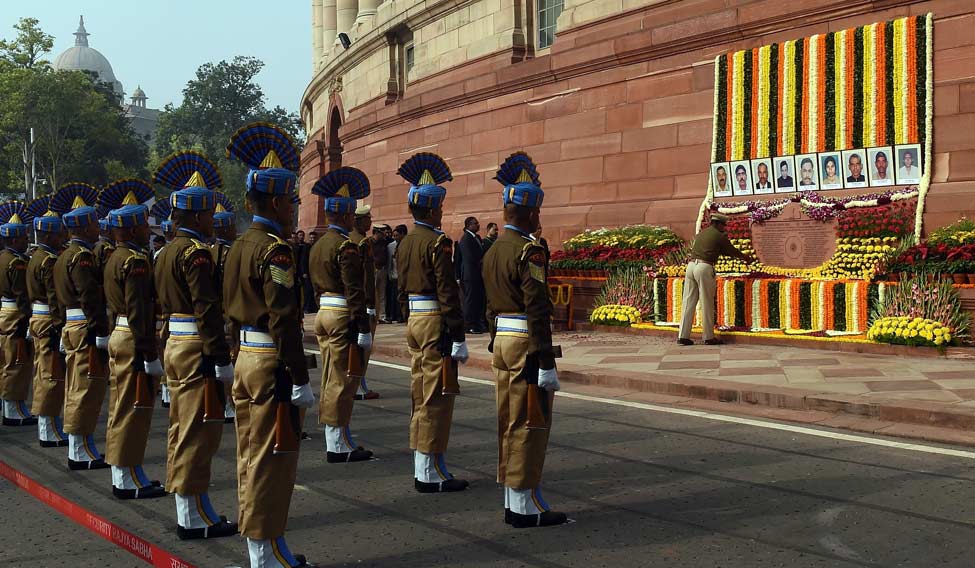The Indian Parliament, symbol of a robust and noisy democracy was taken by surprise when a group of terrorists attacked the sprawling Parliament complex on December 13, 2001. The attack was foiled by the security staff along the outer perimeter and in the ensuing engagement, a total of 14 people were killed—and this included five terrorists.
 C. Uday Bhaskar
C. Uday Bhaskar
The perpetrators belonged to the LeT (Lashkar-e-Taiba) and the JeM (Jaish-e-Mohamad) and were linked with their handlers in Pakistan and its intelligence agencies. The terrorists were able to enter the Parliament complex using a fake security sticker on their vehicle and also by bring their lethal weapons into the complex. But for the grit of the Delhi police and the Parliament security service (whose personnel were killed in this attack), the terrorists could have succeeded in opening fire on the parliamentarians who were in the building at the time. Had they succeeded, it would have dealt a serious blow to India and the world and emboldened the Islamic terror groups. The December 2001 Parliament attack followed the enormity of 9/11 in September of that year when the USA was targeted by Al Qaeda.
It merits recall that the Delhi Parliament attack was preceded by an attack in November on the Jammu and Kashmir legislative assembly in Srinagar in which 38 people were killed. Clearly symbols of the vitality of Indian democracy were being targeted.
An urgent review of security protocols was undertaken after this surprise attack as regards the Indian Parliament and in the last 16 years, entry into the Parliament complex has been made very stringent. I can recall entering this complex in the 1980’s and 1990’s to visit the library and driving through the premises from South Block to reach Parliament street—but that kind of easy access is now a memory of the past. Under the new protocols, a common citizen cannot even access the rich parliamentary library—a restriction that one hopes will be reviewed
Investigations revealed that security agencies in Pakistan had planned and executed this attack through the terror groups they had nurtured and in response, the Vajpayee government mobilised the Indian military in what is recalled as Operation Parakram. The vast Indian military machine was moved closer to the border and Pakistan under General Musharraf also mobilised. The fact that both India and Pakistan were nuclear weapon capable, caused deep anxiety at the global level. At the time, this tense situation on the sub-continent was perceived to be similar to the October 1962 Cuban missile crisis.
The USA and other major powers intervened and Pakistan was prevailed upon to make a public declaration that it would not allow terrorist to operate from its soil. General Musharraf made this insincere statement on January 12, 2002 and it seemed that a major military confrontation had been avoided.
At the time the USA and its allies were more focused on the war in Afghanistan and Pakistan had been recognised as an indispensable ally in the global war on terror—GWOT. It was a different matter that the wily Musharraf was playing both sides of the terror divide—hunting with the hounds and running with the hare—a devious strategy that has frustrated both India and the USA for decades.
The terror attacks against India continued and in May 2001, a gruesome attack was carried out in Kaluchak in Jammu where the softest targets—the families of soldiers were brutally killed. India bristled and some moves were made on the military chess board but were again put on hold by urgent US intervention. Then US Deputy Secretary of State, Richard Armitage, visited the region and extracted a commitment from General Musharraf that Pakistan would stop all support to terror groups and activities. The Vajpayee government was persuaded to accept this commitment and finally Op Parakram was stood down in mid October 2002. Both sides de-mobilised after losing many lives and expending considerable military stock.
The question that arises after 16 years is if such a terror attack on the Parliament can occur again. The answer, to my mind, is an emphatic no. The general level of security protocols and access to public buildings such as Parliament has become far more stringent and this is a pattern that one can discern globally. The parliamentarian is safer but what of the hapless Indian citizen?
Thus, the more relevant question is if India is better prepared to deal with this scourge of terror, motivated by a mix of radical ideology linked to Islam and audaciously nurtured by the deep-state in Pakistan. Here the answer is not as clear. The very fact that the December 2001 Parliament attack was followed a few years later by the tragedy that struck Mumbai in November 2008 (26/11) is illustrative of India’s perennial vulnerability to such attacks. And General Musharraf’s most recent public statement that as the Pakistan Army Chief he was quietly supporting terror groups, is indicative of the deep links that the ‘deep-state’ has established with the likes of Hafiz Saeed and the Islamic terror eco-system.
However, the good news is that outside of Jammu and Kashmir, the actual number of deaths/killings linked to Islamic terror has dwindled considerably. Figures for the last four years are as follows: 2013-25 deaths; 2014-4; 2015-13 and 2016-11. But as the terror attacks in 2016 at Pathankot, Uri, Nagrota and the most recent July 2017 attack on the Amarnath Yatra pilgrims indicated—the threat remains potent.
There are many gaps and inadequacies in India’s composite security capability and most of these were identified in the aftermath of the Kargil war of 1999. However, the higher defence management of India which is symbolised by the Parliament and distilled into the CCS (cabinet committee on security) remains indifferent to make the necessary investment and related change.
When was the last time that a citizen can recall an objective and constructive debate in Parliament on national security? Alas, what comes to mind is the alacrity with which this esteemed body awards privileges and fiscal benefits unto itself. That is the dirge of December 13, 2001.
Bhaskar is director, Society for Policy Studies, New Delhi
Disclaimer: The views expressed in this article are solely those of the author and do not necessarily represent the views of the publication





